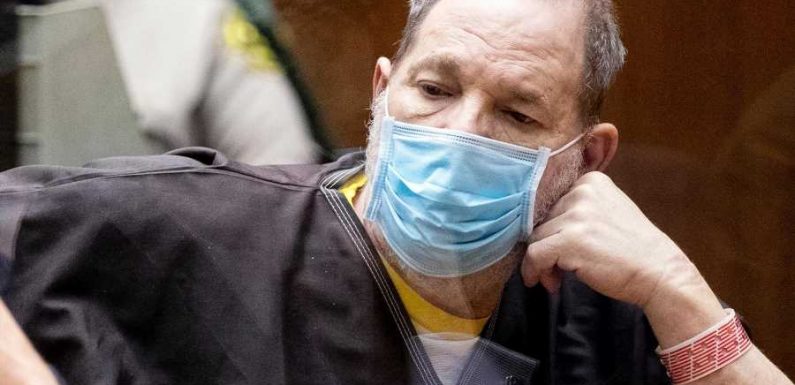
Harvey Weinstein’s alleged inability to “perform certain sexual functions” took center stage at a court hearing Tuesday when his defense lawyer tried — but failed — to get the jailed movie mogul’s Los Angeles indictment on 11 rape and sex assault charges dismissed.
Defense lawyer Mark Werksman argued that a medical expert identified as Jan Hare testified to a Los Angeles grand jury back in March that she didn’t believe Weinstein could perform a “certain physical function” described by the five Jane Doe accusers in the case.
“Based on what she said, she made a liar of each of the five Jane Does,” Werksman said, never explicitly describing the function. The defense lawyer argued that he believed prosecutors improperly “dumped” a mountain of paperwork filled with “incomprehensible medical gobbledygook” on the grand jury to rebut the surprise testimony from Hare, a forensic nurse called by prosecutors.
Related Stories
Rose McGowan's Racketeering Lawsuit Against Harvey Weinstein Dismissed
Harvey Weinstein Pleads Not Guilty to Sex Assault in L.A. Jane Doe Case
Related Stories

Singer Paulette McWilliams on Her Years With Marvin Gaye, Michael Jackson, and Steely Dan
'Silence of the Lambs': 'It Broke All the Rules'
Deputy District Attorney Paul Thompson argued in response that Hare’s testimony “was incorrect in some aspects,” so prosecutors provided the grand jurors with medical records that supported what the Jane Doe witnesses said.
“The Jane Does described the defendant a certain way; Jan Hare described him a different way,” Thompson said. “Jan Hare examined the defendant in 2018; the assaults happened between 2004 and 2013. We have an obligation to the grand jury to correct things that we know to be false.”
Werksman further argued for dismissal of Weinstein’s indictment Tuesday with the argument that prosecutors improperly called in a psychologist to testify before the grand jury about why some rape victims sometimes make inconsistent statements in the aftermath of assault. He said that on the fifth day of the proceeding, prosecutors called in Dr. Mindy Mechanic to “put their thumb on the scale” and “push the witness testimony that was weak and insufficient over the finish line.”
Prosecutors argued they had an obligation to rebut certain “rape myth” material that the defense provided to the grand jury.
Judge Lisa Lench listened to arguments for nearly two hours and said she appreciated the “excellent lawyering on both sides.” She then denied the defense motion asking to toss the indictment.
“I respectfully disagree with the defense in this matter,” Judge Lench said as Weinstein sat quietly in his wheelchair, which he used to rock forward and backward throughout the hearing.
“I don’t think the testimony of Dr. Mechanic’s was inappropriate. I think there are certain rape myths that are sort of common knowledge and are permitted to be rebutted by appropriate testimony from an expert,” Lench said.
She added that even with other alleged “irregularities” in witness testimony, “I believe there is still sufficient evidence to find that the crimes that were alleged to have occurred occurred, and that there was sufficient evidence to support the charges in this matter.”
The disgraced movie mogul and convicted rapist, 69, who was ushered into the courtroom with a waist shackle that attached to his handcuffs, was only allowed to have his right hand removed from the cuffs before the proceeding began. “This is the first time that happened,” he muttered in protest.
He has pleaded not guilty to 11 counts of sex assault involving five unidentified women. Prosecutors allege he raped three women and sexually assaulted two others during attacks at hotels in and around Beverly Hills between 2004 and 2013.
The Los Angeles DA’s office first charged Weinstein on Jan. 6, 2020, just as jury selection was getting underway at Weinstein’s New York criminal trial.
On Feb. 24, 2020, the Manhattan jury found Weinstein guilty of the two felony sex crimes: the third-degree rape of aspiring actress Jessica Mann at a Midtown Manhattan DoubleTree hotel in 2013 and the first-degree sex assault on production assistant Miriam Haley in Weinstein’s SoHo apartment in 2006.
The once-powerful Oscar winner was sentenced to 23 years in prison on March 11, 2020, in a landmark #MeToo moment just days before Covid-19 lockdowns took hold around the country. He appealed the New York conviction in April, two months before he was extradited to California. While there is no trial date yet set for the Los Angeles case, Weinstein has a right to trial within 120 days of a scheduled May 4 hearing.
Source: Read Full Article